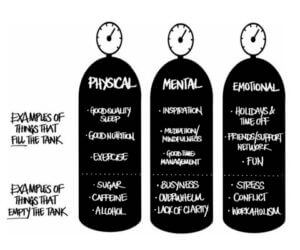Written by Contributing Writer, Rachel Turner
Stress, overwhelm, and exhaustion is ubiquitous among founders. It’s no surprise, then, that recent research identifies founder burnout as one of the top twenty reasons for the failure of VC-backed start-ups. Even if you’re not at risk of burnout, your levels of stress, overwhelm, and exhaustion will negatively impact the quality and effectiveness of your leadership.
When I talk with founders about stress, I routinely hear things like, ‘It’ll be better when we’ve raised finance/got through the board meeting/hired a new COO.’ The assumption seems to be that stress is a short-lived response to a transient external circumstance. But the reality is that, while the stressors may change, a founder’s stress levels are likely to be constantly high for a significant period. Given that the average length of time from start-up to business sale is between six and ten years, you’re likely to be dealing with high levels of stress for a long time. Whatever your long-term plans or exit strategy may be, foundership is a marathon, not a sprint, and you need to stay race-fit throughout.
You want your business run by the best version of you, and Energy Mastery is a precondition of that. Energy Mastery can’t be something you try to squeeze in around the edges of your eighteen-hour workday if you’re going to survive as a founder and genuinely give your business what it needs. Self-care has to come first, not last. If you put it first, everything else becomes first class.
If you want to survive and thrive as a founder, you can’t afford to ignore the issue of self-care. Let’s return to our analogy of the champion tennis player. They can have the best skills in the
World can have nailed the inner game of Mind Mastery, but if they’re exhausted, hungover, stressed or burnt out, they’re not going to win Wimbledon. The commercial landscape you operate in is incredibly competitive, just like the tennis player’s grand slam tournament, and your ability as a founder to bring your energetic A-game will give you the competitive advantage you need to succeed.
You don’t need me to tell you what great self-care looks like. I imagine you’ve been lectured at by partners, gym freaks and doctors alike. You know the benefits of a low-sugar/dairy/ wheat diet, of drinking water, limiting caffeine and alcohol, getting good-quality sleep, regular exercise and practicing meditation or mindfulness. I’m going to ask you to view self- care through a different lens. Rather than thinking of self-care as a list of ‘shoulds’ that you either resist or beat yourself up about, see them as a list of things that will either enhance or detract from your ability to play your A-game.
The three energy tanks
One simple model you could use when thinking about Energy Mastery is the three energy tanks. Imagine yourself with three tanks on your back, like the air tanks a diver would use. These
three tanks represent your reserves of physical, mental and emotional energy.
At any time, you are either drawing on or refilling these reserves of energy through the activities you are engaged in. Certain activities deplete your reserves while others refill them. The activities that will be most supportive for you will depend entirely on your unique personality, lifestyle and ambitions.

Let’s take two highly successful founders I work with as examples. Chris is a gregarious, sporty thrill-seeker while Carrie is an elegant, refined Mayfair-dweller. Chris is at his best when he rides his high-performance bike three times a week and plans his next trek in Patagonia with his mates. Carrie is at her best when she has regular meditation sessions, massages, treatments and classes with a personal yoga teacher. Chris can cope fine with the odd glass of wine in the week. Carrie is much better when she doesn’t drink at all. Chris drinks protein shakes and has a military regime of supplements. Carrie does a clean-eating detox twice a year. The only habit they share is that they are both religious about their morning routines and managing their diaries to keep them focused and effective.
Like Chris and Carrie, it doesn’t matter what you do to manage your emotional, physical and psychological energy, so long as you do it. If you’re more Krav Maga than mindful meditation, no problem. If you’re more vindaloo curry than green juice – if it gives you good, consistent physical energy – who am I to argue with you? If you like to work all night and sleep till midday, that genuinely serves you, and you can set your business up to work like that, then go ahead. Just make sure you’re not giving yourself excuses for behaviors that actually mean you’re not at your best. Be honest with yourself. Grow the habits and disciplines you need to put in your peak performance, and make sure you can do it for the marathon, not just the sprint. Adapt, explore, enjoy and be at your best.
If you’re regularly running on empty, you can use the frame- work of the three tanks to create your own extreme self-care regime which will help you stay fit for the founder marathon.
Think of your physical, mental and emotional energy tanks and ask yourself three questions:
- On a scale of 1–10, how full is each tank?
- For each tank, what activities or habits are most depleting for you?
- For each tank, what activities or habits are most nourishing for you?
You can then use this information to move the dial on your self-care, in line with your preferences as a founder for either flexibility or planning. For example:
▶ If you like flexibility, use your answers to tweak your self- care on a weekly basis. Each week, do one more thing from the nourishing list and stop doing one thing from
the depleting list.
▶ If you love a plan, take your answers and formulate a 3–6 month ‘match-fit’ plan for yourself.
The latter is the approach I favor, so once a quarter, I review my tanks, then make a plan for how to improve my nutrition, exercise and emotional self-care for the coming months. I might add in a juice fast or book some one-to-one sessions with a trainer. I might book a yoga retreat or sign up to a new meditation programme. Sometimes I’ll add in a specific smart goal (e.g. lose 2 kg) or block chunks out of my diary to ensure I don’t get too tired or rushed.
Whichever approach you choose, think of self-care as a separate workstream that needs as much attention as your financial systems, sales pipeline or top team. Without it, none
of those will work for long anyway!
About the author:
Rachel Turner is author of The Founder’s Survival Guide and coach and principal at VC Talent Lab







